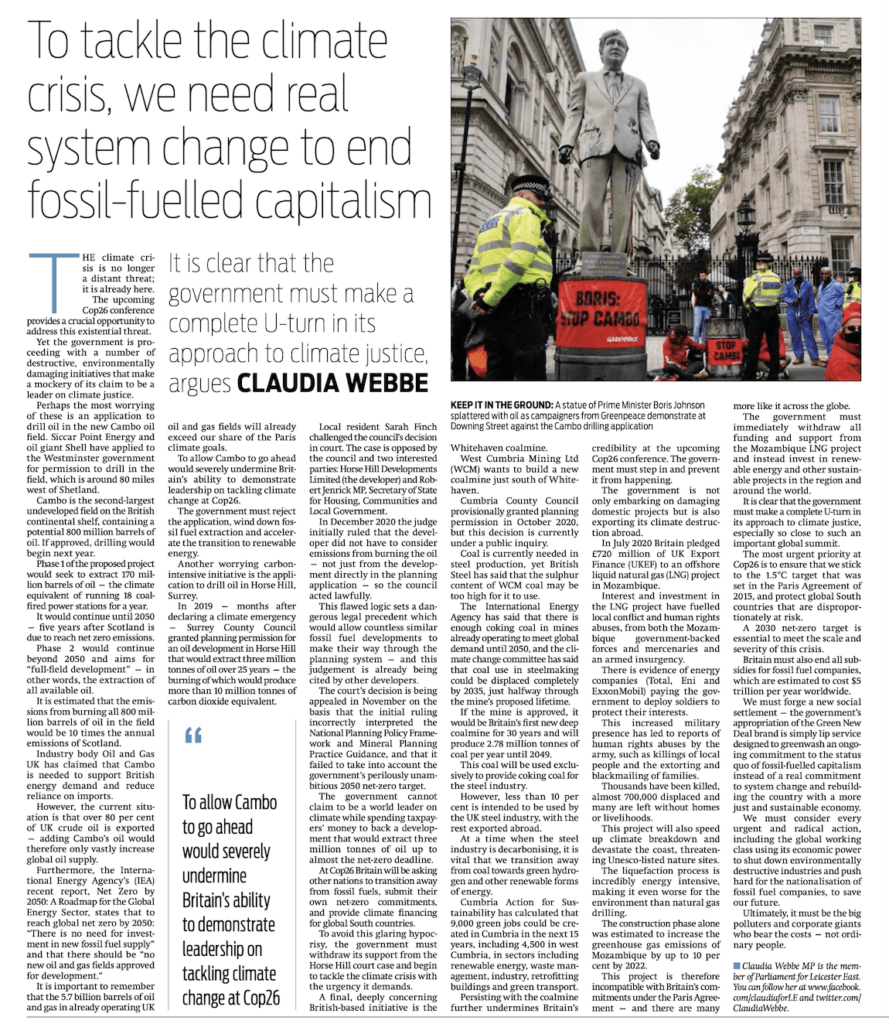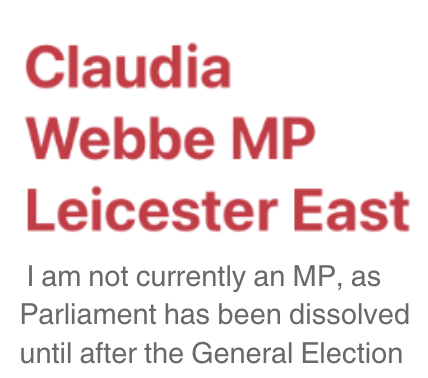
To tackle the climate crisis, we need real system change to end fossil-fuelled capitalism
By Claudia Webbe MP
It is clear that the government must make a complete U-turn in its approach to climate justice, argues CLAUDIA WEBBE MP
THE climate crisis is no longer a distant threat; it is already here.
The upcoming Cop26 conference provides a crucial opportunity to address this existential threat.
Yet the government is proceeding with a number of destructive, environmentally damaging initiatives that make a mockery of its claim to be a leader on climate justice.
Perhaps the most worrying of these is an application to drill oil in the new Cambo oil field. Siccar Point Energy and oil giant Shell have applied to the Westminster government for permission to drill in the field, which is around 80 miles west of Shetland.
Cambo is the second-largest undeveloped field on the British continental shelf, containing a potential 800 million barrels of oil. If approved, drilling would begin next year.
Phase 1 of the proposed project would seek to extract 170 million barrels of oil — the climate equivalent of running 18 coal-fired power stations for a year.
It would continue until 2050 — five years after Scotland is due to reach net zero emissions.
Phase 2 would continue beyond 2050 and aims for “full-field development” — in other words, the extraction of all available oil.
It is estimated that the emissions from burning all 800 million barrels of oil in the field would be 10 times the annual emissions of Scotland.
Industry body Oil and Gas UK has claimed that Cambo is needed to support British energy demand and reduce reliance on imports.
However, the current situation is that over 80 per cent of UK crude oil is exported — adding Cambo’s oil would therefore only vastly increase global oil supply.
Furthermore, the International Energy Agency’s (IEA) recent report, Net Zero by 2050: A Roadmap for the Global Energy Sector, states that to reach global net zero by 2050: “There is no need for investment in new fossil fuel supply” and that there should be “no new oil and gas fields approved for development.”
It is important to remember that the 5.7 billion barrels of oil and gas in already operating UK oil and gas fields will already exceed our share of the Paris climate goals.
To allow Cambo to go ahead would severely undermine Britain’s ability to demonstrate leadership on tackling climate change at Cop26.
The government must reject the application, wind down fossil fuel extraction and accelerate the transition to renewable energy.
Another worrying carbon-intensive initiative is the application to drill oil in Horse Hill, Surrey.
In 2019 — months after declaring a climate emergency — Surrey County Council granted planning permission for an oil development in Horse Hill that would extract three million tonnes of oil over 25 years — the burning of which would produce more than 10 million tonnes of carbon dioxide equivalent.
Local resident Sarah Finch challenged the council’s decision in court. The case is opposed by the council and two interested parties: Horse Hill Developments Limited (the developer) and Robert Jenrick MP, Secretary of State for Housing, Communities and Local Government.
In December 2020 the judge initially ruled that the developer did not have to consider emissions from burning the oil — not just from the development directly in the planning application — so the council acted lawfully.
This flawed logic sets a dangerous legal precedent which would allow countless similar fossil fuel developments to make their way through the planning system — and this judgement is already being cited by other developers.
The court’s decision is being appealed in November on the basis that the initial ruling incorrectly interpreted the National Planning Policy Framework and Mineral Planning Practice Guidance, and that it failed to take into account the government’s perilously unambitious 2050 net-zero target.
The government cannot claim to be a world leader on climate while spending taxpayers’ money to back a development that would extract three million tonnes of oil up to almost the net-zero deadline.
At Cop26 Britain will be asking other nations to transition away from fossil fuels, submit their own net-zero commitments, and provide climate financing for global South countries.
To avoid this glaring hypocrisy, the government must withdraw its support from the Horse Hill court case and begin to tackle the climate crisis with the urgency it demands.
A final, deeply concerning British-based initiative is the Whitehaven coalmine.
West Cumbria Mining Ltd (WCM) wants to build a new coalmine just south of Whitehaven.
Cumbria County Council provisionally granted planning permission in October 2020, but this decision is currently under a public inquiry.
Coal is currently needed in steel production, yet British Steel has said that the sulphur content of WCM coal may be too high for it to use.
The International Energy Agency has said that there is enough coking coal in mines already operating to meet global demand until 2050, and the climate change committee has said that coal use in steelmaking could be displaced completely by 2035, just halfway through the mine’s proposed lifetime.
If the mine is approved, it would be Britain’s first new deep coalmine for 30 years and will produce 2.78 million tonnes of coal per year until 2049.
This coal will be used exclusively to provide coking coal for the steel industry.
However, less than 10 per cent is intended to be used by the UK steel industry, with the rest exported abroad.
At a time when the steel industry is decarbonising, it is vital that we transition away from coal towards green hydrogen and other renewable forms of energy.
Cumbria Action for Sustainability has calculated that 9,000 green jobs could be created in Cumbria in the next 15 years, including 4,500 in west Cumbria, in sectors including renewable energy, waste management, industry, retrofitting buildings and green transport.
Persisting with the coalmine further undermines Britain’s credibility at the upcoming Cop26 conference. The government must step in and prevent it from happening.
The government is not only embarking on damaging domestic projects but is also exporting its climate destruction abroad.
In July 2020 Britain pledged £720 million of UK Export Finance (UKEF) to an offshore liquid natural gas (LNG) project in Mozambique.
Interest and investment in the LNG project have fuelled local conflict and human rights abuses, from both the Mozambique government-backed forces and mercenaries and an armed insurgency.
There is evidence of energy companies (Total, Eni and ExxonMobil) paying the government to deploy soldiers to protect their interests.
This increased military presence has led to reports of human rights abuses by the army, such as killings of local people and the extorting and blackmailing of families.
Thousands have been killed, almost 700,000 displaced and many are left without homes or livelihoods.
This project will also speed up climate breakdown and devastate the coast, threatening Unesco-listed nature sites.
The liquefaction process is incredibly energy intensive, making it even worse for the environment than natural gas drilling.
The construction phase alone was estimated to increase the greenhouse gas emissions of Mozambique by up to 10 per cent by 2022.
This project is therefore incompatible with Britain’s commitments under the Paris Agreement — and there are many more like it across the globe.
The government must immediately withdraw all funding and support from the Mozambique LNG project and instead invest in renewable energy and other sustainable projects in the region and around the world.
It is clear that the government must make a complete U-turn in its approach to climate justice, especially so close to such an important global summit.
The most urgent priority at Cop26 is to ensure that we stick to the 1.5°C target that was set in the Paris Agreement of 2015, and protect global South countries that are disproportionately at risk.
A 2030 net-zero target is essential to meet the scale and severity of this crisis.
Britain must also end all subsidies for fossil fuel companies, which are estimated to cost $5 trillion per year worldwide.
We must forge a new social settlement — the government’s appropriation of the Green New Deal brand is simply lip service designed to greenwash an ongoing commitment to the status quo of fossil-fuelled capitalism instead of a real commitment to system change and rebuilding the country with a more just and sustainable economy.
We must consider every urgent and radical action, including the global working class using its economic power to shut down environmentally destructive industries and push hard for the nationalisation of fossil fuel companies, to save our future.
Ultimately, it must be the big polluters and corporate giants who bear the costs — not ordinary people.
Claudia Webbe MP is the member of Parliament for Leicester East. You can follow her at www.facebook.com/claudiaforLE and twitter.com/ClaudiaWebbe


